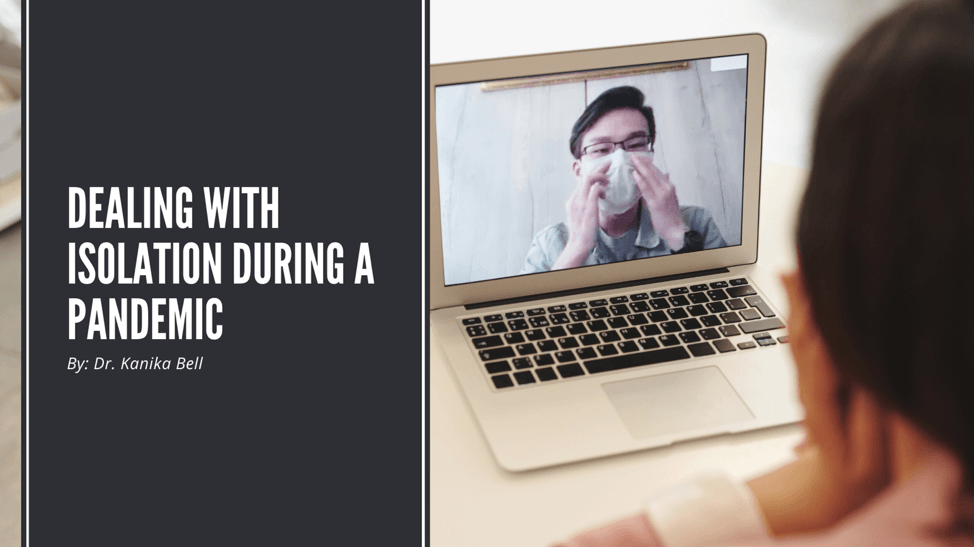A fair amount of memes are circulating on social media encouraging people to “check on the extroverts” as they are “not ok” during this quarantine. One might assume that only extroverts are suffering during this isolative period. After all extroverts don’t just like people, they NEED people. Conversely, one might assume that introverts have finally gotten their day. But that is not necessarily true. In fact, extroverts may be fairing a bit better as they have a wider range of expertise when it comes to how to creatively connect with others. Whether you were a person with a high need for interpersonal contact or a person with a lower need for humanness in your space, being quarantined takes away our choice of being in community with one another. Whether we love big crowds or prefer smaller groups, we gather. When celebratory events take place in the family like weddings or graduations, we gather. When sadness befalls us and we process a death or losing a job, we gather. When we want to get to know new people or reconnect with old friends, we grab coffee, go to lunch, hang out, kick back, come through…we gather. And now, regardless of what is happening in our lives, whatsoever we do…we cannot, and “should” not, gather. That can leave many of us feeling isolated and left alone to process feelings of frustration and fear.
This pandemic has served as an unwelcome reminder to some that they live alone. Or possibly worse, they feel alone, even though they live with others. At the start of the pandemic, adorable virtual game nights, tele happy hours, and even distanced birthday parties were welcomed, or at least tolerated, because we assumed they were a temporary fix. As the months have dragged on, these virtual makeshift connections have become for many, a lot less adorable. So how do you beat that feeling of isolation during the pandemic?
- Keep a routine – set a schedule for your daily events, but don’t beat yourself about it. Be flexible but do have an idea of what you should be doing and when. An organized day feels more purposeful and can stave off feelings of isolation.
- Create something – do something artistic even if you have not one bit of aesthetic talent! Paint something. Sculpt something. Bake something. Create! Creativity has been shown to reduce anxiety, depression and stress.
- Change your space – alter your environment in some way. Move your bed near the window, switch your dining room and living room curtains, paint one wall. The actual act of redecorating reduces anxiety and the changes often feel personal and nurturing.
- Do something meaningful online – avoid binging on distressing news and learn something new online. Sign up for a language class or a cooking demonstration. It is often advised to reduce screen time, but sometimes, screens provide a sense of company. So if the screen is your companion for an evening, find something meaningful to do with your time together. Write a letter to an old friend or comprise a list of local sustainable businesses to support. Having a functional relationship with one’s computer can reduce the dependency loneliness.
- Do something good for humankind – Decide to start recycling. Look for safe ways to contribute to your community like delivering food to the doors of the infirm or gather and donate cleaning supplies to local schools. Include your children in a letter writing campaign to service men and women overseas. Do something with your time that develops a sense of pride.
- Plan for the future – First, assure yourself that the pandemic will end at some point. We do not know when, but it will, at some point. At times we can become overwhelmed with feeling like this will never end. But it will. It will end. So get yourself ready! Think about all of the places you would like to visit when it is safe to travel. Plan out the restaurant hopping that you will do rediscovering the best patio dining in town. Promise yourself that you will visit your aunt in Arizona and see the Grand Canyon or simply just go to the free summer festivals in your city. This pandemic has granted us a rare opportunity to be still and develop an appreciation for the things once taken for granted like stopping off for ice cream or listening to jazz in the park with the rest of your city. Decide you will savor those moments when blessed with them again.
- Develop and execute a daily self-care regimen – put yourself on your schedule every single day. If it is a bath, a popsicle and your favorite literary romance genre, do the routine daily. It may be meditation, yoga and a healthy meal. It may be working on a model airplane, a video game and catching up on sports highlights. Whatever your regimen is for self-care, do it faithfully. Self-care is the perfect distraction for feelings of isolation.

Dr. Kanika Bell is a licensed psychologist, specializing in clinical and forensic psychology, in the Atlanta area. She received her undergraduate degree in psychology from Spelman College and received her Masters and Doctoral degrees in clinical psychology from Auburn University. She is co-owner of A.T.L. Psychotherapy and Consulting Services, LLC in Atlanta, GA where she provides therapy to children, adults, couples and families. She is also an Associate Professor in the Department of Psychology at Clark Atlanta University. Dr. Bell’s passion is assisting clients and students in recognizing and maximizing their greatness. Her most recent project is a co-edited volume entitled Black Women’s Mental Health: Balancing Strength and Vulnerability and is currently working on an additional volume focusing on the particular mental health needs of Women of Color.

